
by Melanie Taylor | Sep 29, 2021
Until July 2, 2021, I felt confident I had done everything possible to stay safe and avoid contracting Covid-19. Throughout 2020 and well into 2021, I worked from home, socialized very little, quarantined when necessary, wore my mask, and constantly washed my hands. In fact, I may have dry skin on my hands for the rest of my life, but I still wash my hands frequently. The Covid-19 virus has become a controversial issue over the past two years, but my story is from real experience.
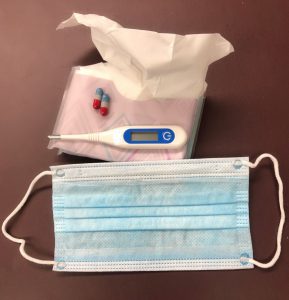
Keeping your fever under control is a necessity when battling Covid-19. Photo credit: Melanie Taylor
As I prepared to have a safe, but fun, Fourth of July weekend with a few vaccinated friends, I was winding down my Friday at work and started to feel achy. I headed home, excited for a 3-day weekend, but I still felt like I was dragging. My husband and I had plans to meet up with friends at a restaurant with outdoor seating, but before I left the house, I decided to take my temperature, just to be cautious. To our surprise, I had a fever of 99.9. We canceled our dinner plans and I took some acetaminophen, went to bed early, and we prayed it was not Covid-19. It was kind of an unspoken prayer because neither of us wanted to admit we were a little nervous about my symptoms. As the weekend carried on, I felt sicker as the hours and days went by and barely left the sofa or bed. On Sunday morning, I woke up with a bad dry, hard cough so my husband called my doctor. To be totally transparent, I am immunocompromised, so we both knew there was a chance I could have a breakthrough case even though I was vaccinated. Based on my symptoms, my doctor recommended I go to the emergency room and be evaluated since it was a 3-day weekend. I followed his directions, had a chest x-ray, which, thankfully, was clear, but I tested positive for Covid-19.
Let me honestly say, this was the sickest I had ever felt in my memories. For about twelve straight days, I laid on the sofa, took my temperature and oxygen levels, had no sense of taste or smell, ate food with no taste to keep up my strength, hydrated, and slept. The body aches, fever, dry cough, and fatigue were debilitating. I had every Covid-19 symptom listed by the CDC except for a headache. I thought to myself many times how bad and scary this could have been if I had not been vaccinated. My doctor clearly expressed his opinion that if I had been unvaccinated, I would have been hospitalized, no questions asked. Unlike many people, it was not recommended for me to take a regimen of pills or vitamins, so I fought it with acetaminophen, lots of hydration, healthy foods, and tons of rest. When I finally woke up on July 14th and could smell the coffee brewing, I knew the end was finally in sight. It still took two more weeks to feel and return to normal, and I knew firsthand this virus is no joke.
Like many of you, I know people that have tested positive and showed no symptoms, some that felt very sick but were able to stay home and recover, and some that never made it home from the hospital. I work in the field of science as a UF/IFAS Extension Agent and feel very strongly that we can all make simple efforts to reduce exposure to ourselves and others. The most important step is to pay attention to the symptoms and stay home if we suspect illness or exposure. Even though I was looking forward to the holiday festivities, I made a conscious decision to stay home on July 2nd just in case I really was positive with Covid-19. I wanted to keep my friends and family safe just in case there was a remote chance I was contagious. I feel very grateful I did not expose them to this virus.
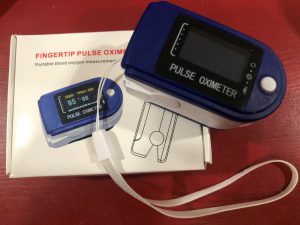
Checking your oxygen levels while sick with Covid-19 is a must. Photo credit: Melanie Taylor
The positive cases in Florida are lower right now, and that is fantastic. I am very excited about it too, but I also know we still shouldn’t put our guard down. Please stay aware. Be aware if you or a family member(s) have been exposed or do not feel well, and check for symptoms. I highly recommend every American household have a reliable thermometer, a pulse oximeter (safe oxygen levels should not go lower than 92), fluids for hydration, and foods of different textures because eating food without being able to taste and smell is very difficult. Different food temperatures, spice levels, and textures made eating to keep up my strength easier for me to handle.
The past two years have been stressful, emotional, and very exhausting. We still cannot forget to stay aware and diligent in our everyday lives to keep our families, friends, and communities healthy. Please revisit these CDC websites as needed and always consult your doctor when you have questions and concerns. Stay aware and healthy out there!
https://www.cdc.gov/coronavirus/2019-ncov/your-health/index.html\
https://www.cdc.gov/coronavirus/2019-ncov/symptoms-testing/symptoms.html
https://www.cdc.gov/coronavirus/2019-ncov/prevent-getting-sick/index.html
https://www.cdc.gov/coronavirus/2019-ncov/testing/index.html
https://www.cdc.gov/coronavirus/2019-ncov/if-you-are-sick/index.html
https://www.cdc.gov/coronavirus/2019-ncov/need-extra-precautions/people-with-medical-conditions.html

by Amy Mullins, PhD, RDN | Sep 24, 2021
September is National Cholesterol Awareness Month. Understanding how to adjust cholesterol and fat in our diet can help to reduce the risks associated with heart disease.
What is Cholesterol? Cholesterol is a waxy type of fat found in all animal cells. This means both the animal-based foods we eat and our own bodies contain cholesterol. Cholesterol is essential for many processes in our bodies, including hormones and vitamin D production. However, we only need a certain amount, and too much can cause problems. Diet and exercise play a key role in keeping our cholesterol levels “in-check.”
Good vs Bad Cholesterol
Cholesterol is often broken down into good and bad cholesterol categories.
- HDL stands for high-density lipoprotein and is considered the good. Higher amounts of HDL can help bring fatty components in your blood back to your liver. The liver helps clear these fatty deposits from your body and can reduce the risk of developing heart disease. You can think of HDL as the helpful cholesterol. HDL can be increased by eating more heart-healthy fats. These are fats low in saturated fat, high in omega-3 and include olive oil, nuts, avocados, and fish.
- LDL stands for low-density lipoprotein and is considered bad. LDL cholesterol does the opposite of HDL. It deposits these fatty deposits to your arteries. You can think of LDL as the lousy cholesterol. LDL can be lowered by reducing the amount of trans fats and saturated fats from the diet. We can also reduce LDL cholesterol by increasing the amount of fiber in our diet.
- According to the CDC, desirable cholesterol values include:
Total cholesterol: less than 200 mg/dL
LDL cholesterol: less than 100 mg/dL
HDL cholesterol: greater than or equal to 60 mg/dL

Choose low-fat or fat-free dairy products for less saturated fat and cholesterol.
Photo credit: USDA SNAP
Cholesterol in Foods
Animal-based foods not only contain cholesterol, but are also high in saturated fat. Our bodies use saturated fats to make cholesterol, which can increase our LDL cholesterol. Limit your intake of these high-saturated fat foods:
- Butter
- High-fat dairy, such as cheese, whole-milk
- Egg yolks
- Fatty cuts of meat, hot dogs, bacon, and high-fat cold cuts
- Animal fat, such as lard, tallow, duck fat
- Fried foods
- Baked goods and snack foods made with lard, butter, palm kernel, coconut oils, or trans-fat
How to Lower Your Cholesterol Intake
- Opt for plant-based fats
- Plant-oils have NO cholesterol!
- They are a great substitution for cholesterol-containing fats such as butter. Not only do they replace cholesterol in your diet but they can also help lessen the absorption of cholesterol from other foods.
- Healthy plant oils include olive, safflower, canola, flaxseed, and sesame oils
- Avocados, walnuts, peanut butter, and other nut-butters are great options!
- Select lean protein foods
- Swap out ground beef for ground turkey or chicken
- Replace grilled steak with grilled chicken or fish
- Remove the extra fat cap on large cuts of meat
- Opt for skinless options of poultry. Skin contains a significant amount of fat.
- Choose low-fat dairy options
- Reach for the low-fat or fat-free options for cheese, yogurt, milk, and cottage cheese.
- This will reduce the amount of cholesterol you eat but still allow you to enjoy these foods.
- Step-up your fiber game!
- Just like plant-based oils, fiber can help reduce the amount of cholesterol you absorb from foods. Fiber creates a gel-like substance in your stomach and can whisk away cholesterol from being taken up into your blood.
- Fiber is in so many delicious foods! High-fiber foods include fruits, vegetables, whole grains, seeds, beans, and nuts.
- To incorporate more fiber into your diet, try:
- Going for a plant-based dinner once a week by including beans, tofu, or lentils instead of meat.
- Making ½ your plate fruits and vegetables at mealtimes.
- Swap refined grains for whole grains, such as brown rice, quinoa, whole-wheat pasta, faro, oatmeal, popcorn.
Replacing foods high in saturated fats with heart-healthy fats can be an effective way to improve your cholesterol levels. This can be as easy as using olive oil in place of butter. Try swapping whole milk in your cereal with 1% or skim milk. Never underestimate how even the smallest changes can make a big difference!
Guest contributor: Stephanie Hill, Master’s student and Dietetic Intern from Florida State University’s Department of Nutrition & Integrative Physiology.
References:
4 ways to eat your way to lower cholesterol. Harvard Health. (2021, February 3). https://www.health.harvard.edu/heart-health/4-ways-to-eat-your-way-to-lower-cholesterol
What is cholesterol? Academy of Nutrition and Dietetics. https://www.eatright.org/health/wellness/heart-and-cardiovascular-health/what-is-cholesterol
Heart Healthy Eating to Help Lower Cholesterol Levels. Cleveland Clinic. https://my.clevelandclinic.org/health/articles/17281-heart-healthy-eating-to-help-lower-cholesterol-levels
Nutrition and Healthy Eating. Mayo Clinic. https://www.mayoclinic.org/healthy-lifestyle/nutrition-and-healthy-eating/in-depth/fat/art-20045550
LDL & HDL: Good & Bad Cholesterol. Centers for Disease Control and Prevention, 31 Jan. 2020, www.cdc.gov/cholesterol/ldl_hdl.htm.

by Judy Corbus | Aug 27, 2021
Next to ensuring your family’s safety and well-being during a hurricane, having a game plan to protect your largest investment – your home and property – is essential in preparing for a major storm or other disaster. Many of these tasks can be done as part of routine home maintenance well before a storm is on the horizon.
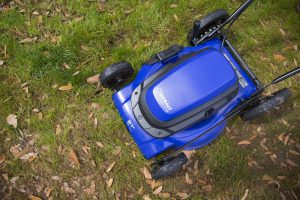
Mow your yard before a storm to make clean-up easier. Photo credit: UF/IFAS Photo by Camila Guillen
Let’s start with the outside:
- Trim back limbs and branches hanging over the roof and any dead limbs elsewhere in the yard. These can break off in high winds, causing roof and siding damage.
- Clean valleys, gutters, and downspouts of leaves and debris. This will improve water flow off the roof, reducing the risk of leaks.
- If a storm is approaching, move trash cans, lawn furniture, grills, decorative items, potted plants, and toys to the garage, shed, or other secure storage area. These items can become flying missiles in high winds!
- Protect windows with plywood or roll-down shutters. These protective barriers can:
- keep wind pressure from building up inside, leading to roof loss
- reduce the chance of glass breakage
- reduce the risk of wind-driven rain damaging your home’s interior
- Be sure to install plywood before wind speeds increase!
- Do NOT apply tape to windows. Tape will not protect against breakage from flying debris and wastes time and resources. Plus, the adhesive can be very difficult to remove from the glass.
- Protect the garage door with vertical bracing. You can install wooden columns or purchase a kit. For more information, check out Protecting and Securing Garage Doors.
- Check doors, windows, and walls for openings where water can enter. Use silicone caulk to seal any gaps, cracks, or holes – pay special attention to cable and pipe openings into the house.
- Test and service your back-up generator to make sure it’s working properly and check your fuel supply. To prevent carbon monoxide poisoning, use your generator only outside and at least 20 feet away from doors, windows, and vents.
- Mow the yard. This makes post-storm clean-up much easier.
Now, we’ll move inside:
- Check your flashlights and stock up on batteries as needed. Plan on a flashlight for every person in the house plus additional lighting for bedrooms, bathrooms, and common areas.
- Check your weather radio to ensure it’s working properly.
- Check smoke detector and carbon monoxide alarm batteries and replace as needed. Hard-wired alarm systems will operate on the battery backup during a power outage.
- Keep your cell phone and other devices charged when a storm is forecast. Purchase backup charging devices for your electronics.
- Gather disinfectant supplies, trash bags, toilet paper, paper towels, paper plates, cups, and plastic utensils. Put these items in a waterproof/water resistant container to keep them clean and (hopefully) dry in case of flooding.
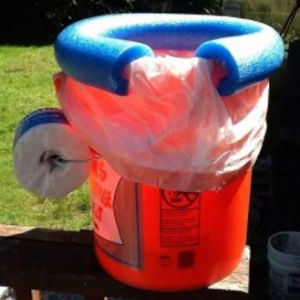
A 5-gallon bucket with a liner can serve as a toilet. Photo credit: Annette Lanham
- If you might be unable to flush the toilet during/after the storm, place a heavy-duty contractor trash bag in the toilet bowl to hold waste. Tie with a plastic tie and dispose of when full or as needed. Another option is to place the bag in a five-gallon plastic bucket. For added comfort, slit a foam pool noodle on one side and slip over the bucket edge for a “seat”; cut to fit. You can have two buckets – one for liquid waste and the other for solids.
- Before the storm arrives, wash dishes, catch up on laundry, clean the kitchen and bathrooms, and empty wastebaskets. This reduces clutter and promotes a clean environment in which to ride out the storm. It also reduces extra work and stress after the storm when water and electricity may be limited or unavailable.
For additional preparation tips, visit Homeowner’s Handbook to Prepare for Natural Disasters
Sources:
Ready.gov
DisasterSafety.org

by Amy Mullins, PhD, RDN | Aug 27, 2021
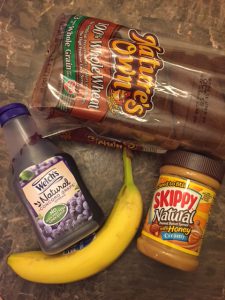
Healthy snacks fuel the athlete! Photo credit: Amy Mullins
When it comes to your kids, you’d do anything to help them succeed… in the classroom, in their relationships, in life. So, why not on the basketball court, soccer field, swimming pool, or whichever sport they’ve fallen in love with? They may have the best equipment, participate in extra training lessons, and put in 110% during every practice and event. But, is this enough? Is there something missing?
It’s no secret that your child is growing. In order to function in their sport, improve performance, and promote recovery, kids need food to help support the increased energy requirements. This ultimately means more planning and more groceries!
Follow these guidelines to fuel your superstar during the week, before the game/event, and after the game/event.
Pre-Game Meal/Snack
Eat a good-sized meal at least three hours before the event. This gives the tummy time to process all the food to prepare it as fuel. Have a light balanced meal with some carbs and fats. These will sustain you throughout your exercise! Carbs and fats are both great fuel sources, and the fats digest slower to help keep you feeling full. Pick foods that digest well to avoid any nausea or upset stomach. Don’t forget to drink some water to start off hydrated!
- Breakfast Ideas: fruit, lightly sautéed potatoes, scrambled eggs, or toast with nut butter or smashed avocado
- Lunch Ideas: turkey or ham sandwich (avoid fatty cheeses and condiments), peanut butter and jelly, fruit, pretzels, or cereal
- Snack 30 minutes before the event: peanut butter crackers, granola bars, fruit snacks, or goldfish crackers
During Practice and Games
For exercise lasting less than an hour, sip on some water to stay hydrated. For exercise lasting longer than an hour, a sports drink like Gatorade or Powerade will help replenish lost carbohydrates and electrolytes. For longer lasting activities or day trips, bring along some easy to eat snacks with lots of carbs, and some fats and proteins. Peanut butter and jelly sandwiches and granola bars are great options!
Post-Game Snack
After exercise, it’s important to recover, refuel, and re-hydrate. Protein will help our muscles recover while carbohydrates will help refuel for the next activity. Drink plenty of fluids to rehydrate! Good choices for quick, easy snacks include chocolate milk, peanut butter crackers, cheese sticks, bananas, apple slices with peanut butter, or smoothies with or without protein.
Dinner Plate After Practice and Games
- Grains/Carbs: Should take up roughly 35% of the plate
- Lean Protein: Should take up roughly 25% of the plate
- Fruits and Veggies: Should take up roughly 40% of the plate
- Hydration: Focus on replenishing lost electrolytes and fluid loss
Components of a well-balanced meal include:
- Meat & poultry – great protein sources for recovery. Pair it with a carb!
- Whole grains, fruit, pasta, rice, potatoes – great carb sources to complement your protein. These will help replace the energy you burned during exercise.
- Water, milk, and fruits will help replenish fluids lost during exercise.
Eating right not only on game day but throughout the week will do wonders for your child’s athletic performance. Not only that, it will set them up to be successful and healthy adults in the future!
Guest contributors: Patrick Burns and E. Jane Watts, Dietetic Interns from Florida State University’s Department of Food, Nutrition, and Exercise Sciences
The use of trade names in this post is solely for the purpose of providing specific information. It is not a guarantee, warranty, or endorsement of the product.
References:
Academy of Nutrition & Dietetics. Ellis, E. (2020). Hydrate Right. https://www.eatright.org/fitness/sports-and-performance/hydrate-right/hydrate-right
American Dietetic Association, Dietitians of Canada, American College of Sports Medicine,
Rodriguez, N. R., Di Marco, N. M., & Langley, S. (2009). American College of Sports Medicine position stand. Nutrition and athletic performance. Medicine and science in sports and exercise, 41(3), 709–731.
https://performancepartner.gatorade.com
https://www.eatright.org/fitness/sports-and-performance/tips-for-athletes/gameday-nutrition-tips-for-young-athletes

by Julie McMillian | Aug 27, 2021

Fingerpainting Baby Sensory Photo Source: Julie McMillian
In the early childhood years there are key experiences that are essential to development. Babies and toddlers benefit from sensory activities and it is important for overall health and well-being. When does sensory development start? The answer is before we are born. Everything we do as humans involves our senses. In a child’s first five years, sensory play supports cognitive development, language, problem solving, and social and emotional interaction as well as motor development. Research shows that sensory play is needed for children to develop more complex learning abilities as they grow.
During the first twelve months, an infant begins to build an understanding of their world. It can seem like a challenging time because they are often exploring with their mouth. There are some simple activities that are both safe and entertaining for babies at this age.

Baby Sensory Bin Photo Source: Julie McMillian
Sensory bins are hands-on interactive tools that use sight, touch, taste, hearing and smell. A sensory bin can also be used to hide and find objects which creates an opportunity to encourage language development. Fine motor skills can be developed by using the pinching, grasping, scooping, pouring, and stirring movements with a variety of tools. Sensory bins can be inexpensive and switched out easily to create strength and hand development.
Sensory Bin Ideas
- Sponges and Water
- Cooked pasta with food coloring
- Dry Cereal with or without toys
- Oobleck (2 cups cornstarch and 1 cup water)
- Gelatin
Outdoor sensory play is another great way to use multi-sensory experiences for healthy child development. Outdoor equipment at home or the park can be used. Simple experiences with grass, sand and water encourage exploration and creativity. A reserved child may come out of their shell when outdoors. Nature opportunities will provide health benefits of fresh air, exercise, and vitamin D.

Baby Sensory Outdoors Photo Source: Julie McMillian
Outdoor Sensory Ideas
- Sit in the grass
- Crawl in the sand
- Smell the flowers
- Touch the leaves
- Take a nature walk
- Have a picnic
- Read a book
As a care giver, you can focus on a certain skill that may be lacking in a child’s development or provide an array of activities that stimulate growth. When children can explore and try new experiences they can attach meaning and unlock key skills needed for their future. Sensory play is valuable and essential for learning and the activities are endless.

by Heidi Copeland | Aug 27, 2021
Can you believe it? Here we go, again! The Covid-19 delta variant case surge is an unwelcome visitor for sure!
What works? What doesn’t work? I have always liked to err on the side of caution. Sound science is both prudent and responsible. Sound science says masks are necessary for our personal safety and the safety of those around us. In fact, with the dramatic rise in the number of Covid-19 delta variant cases, masks are being seen as necessary – in the workplace, in public, and at home in the event there is a contagious individual. The delta variant transmission rate is more easily spread than the original strain of Coronavirus. In fact, the Covid-19 delta variant:
- Is more contagious
- Might cause more severe illness than previous strains in unvaccinated persons

A protective face mask can help to reduce the spread of the COVID-19 virus.
Photo credit: Heidi Copeland
Public health experts advise mask protection. Wearing a mask works. What kind of mask? A mask that is protective. Protective masks fit (your glasses do not fog), protective masks have a high filtration efficiency (materials, plus fit), protective masks have an extra layer of protection, and protective masks are large enough to cover both the nose and mouth at the same time and small enough to ensure large gaps do not occur. Protective masks should be comfortable enough for extended wear.
An efficient way to use what we already have is to double up – layer prevention strategies. Layering means wearing a cloth mask on top of a surgical mask or wear two cloth masks. Adding a filter also can extend the life of what we already own.
I’ve recently seen a few good mask hacks. One such hack involves using hair clips to hold the loops of the mask tightly at the back of the head and the other hacks tie the loops in such a way as to minimize any gaps on the side of your cheek, nose, and chin.
Although we are not quite back to square one, the ugly Covid-19 virus and its variants continue to rear their hideous head primarily through the air. If indoor space is shared – EVERYONE should be wearing a mask.
Let’s face it, we are relying on the decisions other people make. If everyone makes good decisions, we can bask in the glory that we did our part to help ourself and our neighbor.
Mask’s work.
For more information, visit: https://www.cdc.gov/coronavirus/2019-ncov/variants/delta-variant.html
















